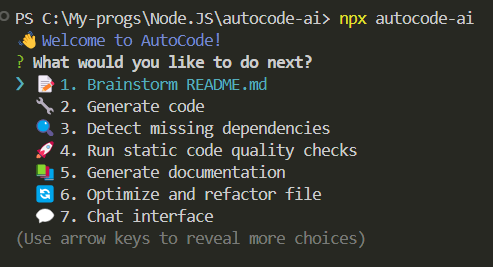
Research
Two Malicious Rust Crates Impersonate Popular Logger to Steal Wallet Keys
Socket uncovers malicious Rust crates impersonating fast_log to steal Solana and Ethereum wallet keys from source code.
autocode-ai
Advanced tools
An innovative automatic coding tool that generates projects from README.md using Claude 3.5 Sonnet API
AutoCode is an innovative automatic coding tool designed to bootstrap any software project incrementally, transforming README.md instructions into a fully functional software project using Claude 3.5 Sonnet API. AutoCode was bootstrapped by itself from one simple prompt.

No installation is required. AutoCode can be run directly using npx.
npx autocode-ai
AutoCode reads your README.md file and your sources and sends the instructions to the Claude 3.5 Sonnet API. The API interprets the instructions and generates the necessary code structure, files, and content. AutoCode then saves the generated code back to your project directory. It can now generate code for different languages based on the project requirements and applies language-specific linting and formatting.
AutoCode currently supports the following programming languages:
Each language has its own configuration for file extensions, recommended linter, formatter, and package manager.
This option updates the README.md file with new design ideas and considerations. It uses AI to generate improved content for your project's documentation. Please review often and remove non-realistic ones. You can add #TODO items at the end.
Allows you to select specific files for code generation or updating. The AI will create or modify the selected files based on the project's README and existing structure. Please select only limited amount of files, needed for your particular goal/feature. After generation code review is highly recommended.
Analyzes your project to identify any missing dependencies and suggests additions to your package.json file, as well as creation of missing source files. You can generate those auto-created files later.
Performs linting and code quality checks on selected files. It can automatically fix some issues and create missing files if needed.
Creates or updates documentation for selected files, including inline comments and separate documentation files.
Analyzes and improves the code structure of selected files, suggesting refactoring options for better performance and readability.
Enables a conversation with the AI about specific files or project-wide changes. You can provide suggestions and receive code updates. Works only with one file. For mulitple file updates, please use step #2.
Creates comprehensive documentation for the entire project, including architecture overview, API documentation, and usage instructions.
Adjusts the AI's creativity level for code generation. Higher temperatures produce more varied results, while lower temperatures are more conservative.
Remember to use these features iteratively and in combination for the best results in your development process. You have to find balance between AI and human work.
For single file features menu option #7 is recommended. For features among multiple files, option #1 is recommended (after adding #TODO items in README.md)
FAQs
An innovative automatic coding tool that generates projects from README.md using Claude 3.5 Sonnet API
We found that autocode-ai demonstrated a healthy version release cadence and project activity because the last version was released less than a year ago. It has 1 open source maintainer collaborating on the project.
Did you know?

Socket for GitHub automatically highlights issues in each pull request and monitors the health of all your open source dependencies. Discover the contents of your packages and block harmful activity before you install or update your dependencies.

Research
Socket uncovers malicious Rust crates impersonating fast_log to steal Solana and Ethereum wallet keys from source code.

Research
A malicious package uses a QR code as steganography in an innovative technique.

Research
/Security News
Socket identified 80 fake candidates targeting engineering roles, including suspected North Korean operators, exposing the new reality of hiring as a security function.